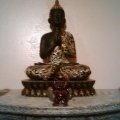Welcome home! Please contact lincoln@icrontic.com if you have any difficulty logging in or using the site. New registrations must be manually approved which may take several days. Can't log in? Try clearing your browser's cookies.
The Seven Factors of Enlightenment - End Game.
 lobster
lobsterPureland Veteran
lobster
lobsterPureland Veteran

Dear friends of the lampshade wearers (tsk, tsk, bad cructacean),
I find it very useful to adjust and adapt. For example yesterday a very agitated formal meditation meant I did a concentration based emphasis today ...
Without knowledge where do we end up?
https://www.accesstoinsight.org/lib/authors/piyadassi/wheel001.html
Without application are we just playing?
https://en.m.wikipedia.org/wiki/Seven_Factors_of_Enlightenment
Game or Path to the end?
3




Comments
I had gotten quite serious with Buddhism a while ago, and was doing my best to do meditative practice and follow all of its dictates in my mind. Then suddenly one day I relaxed, and I found that I had been forcing things, that in my attempt to follow energy and concentration I was no longer relaxed and calm in my being.
And calm, passadhi, is also a factor of enlightenment. So I took a step back from all the -doing- and just relaxed. Perhaps there is more to cultivating the factors of enlightenment than just charging around and following the dharma.
I feel the most calm after I get up in the morning. Sleep usually leaves me feeling refreshed, calm and meditative in the morning, and it is only during the day that this gets broken down by the concerns of modern life.
A you know ideally a meditative mind is focussed calm, rather than forced concentration.
Life is always the problem ...

And there is an interesting key to the situation, we are educated into feeling as we do. Naturally feeling as we feel and living a fulfilling life is an art form too.
I prefer this formulation to the 8-fold path, I think it gives a clearer idea of the practices and qualities involved. In the suttas the seven factors progressively displace the five hindrances.
I seem to have got stuck on the second factor, investigation.
Perhaps you might try developing relaxation, concentration and equanimity? They are the other side of the seven factors after all, you might be able to bring balance to your approach.
I agree it is a good formulation of the path, very educational for those who have focussed on the 8FP for a sila based approach.
I haven't read the links yet, but I play a game. It's based on the same dilemmas described so far in this thread. I call it “Forget Buddhism.” That’s the fun-for-the-whole-family version. Sounds bad, but it's empowering. It enables me to practice with my best understanding. I'm not a Buddhist, because “the Buddhas only point the way;” I'm a wannabe sage, because “you alone must walk the path.” You alone must learn, try, stumble, unlearn, relearn, explore, figure it out for yourself. “Adjust and adapt,” “Forget Buddhism” or as Morpheus put it, “There's a difference between knowing the path and walking the path.”
Indeed, the forgetting you mention is called remembrance in Sufism and mindfulness in Dharma.
Our best understanding of The Way is already surprisingly advanced. Most of us know to be kind, generous, quick to forgive and slow to anger etc.
Our knowledge of attributes and ideals is present. Good companionship fuels our alignment ...
Mindfulness (sati)
Keen investigation of the dhamma (dhammavicaya)
Energy (viriya)
Rapture or happiness (piti)
Calm (passaddhi)
Concentration (samadhi)
Equanimity (upekkha)
Here is a graphic I stole from a Zen forum ... convinced that 'righteous theft' is part of the Noble Truths ... I iz hopeless case ...

Sure, balance is important. In crude terms I think you can look at it as a balance between developing the qualities of samatha and vipassana, both on and off the cushion.
I guess I am too enthralled playing to realize this is a game...
Exactly so, from experience you know.
Calm concentration or focussed relaxation is a practical skill development. It is the whole basis of useful cushion time ...
Guided imagery is one of the ways used in dharma schooling. Such a technique includes exploration of themes around our movement, hearing, smell etc ...
One example of where such a process can occur is shrine creation, or sacred space/focus.
http://www.buddhatropolis.com/2011/07/my-secular-buddhist-shrine.html
Another is being in the present moment, without being a fanatic about it ...
... or perhaps
http://buddhismguide.org/guided-meditations/
It's a question of simply relaxing into the moment, one breath at a time, keeping coming back to it, holding on softly to thoughts and emotions, pruning and letting go.
Without striving, without clinging, without effort.
It reminds me of the story of Sona: